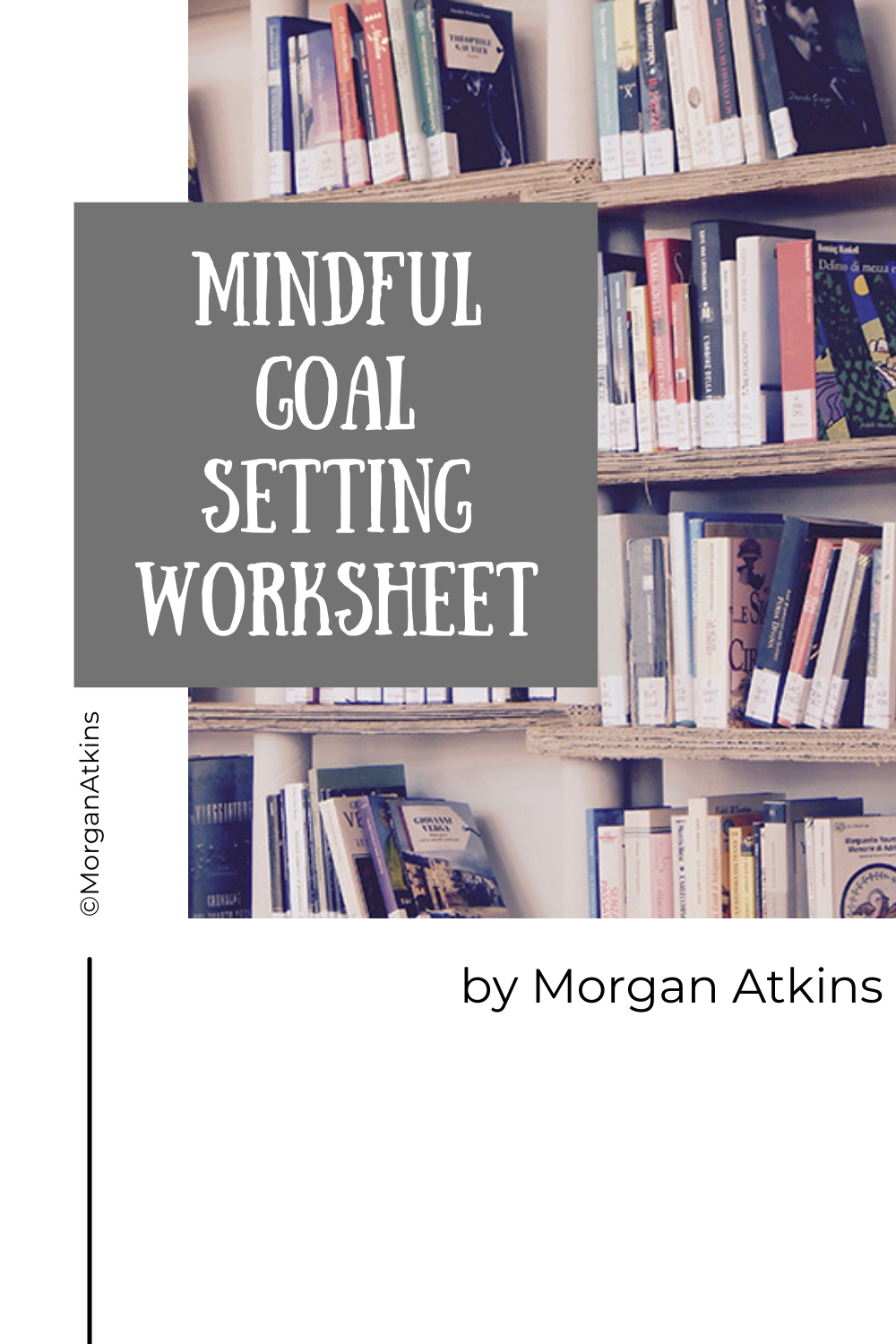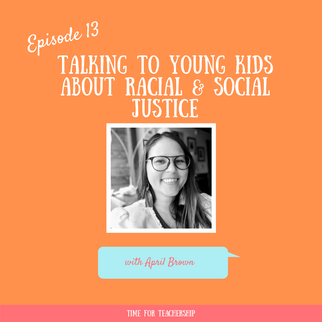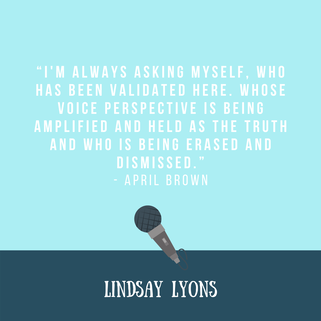
In this episode, it’s all about learning to disrupt structures of racial inequality and advocating for children. April Brown is a trauma informed specialist, curriculum developer, writer, and instructional coach . One of the biggest beliefs for her is that education should be rooted in liberation. The systems of oppression that she’s trying to dismantle are ableism, racism, capitalism, and sexism. “I'm always asking myself, who has been validated here. Whose voice perspective is being amplified and held as the truth and who is being erased and dismissed.” Her journey started when she came across an article while pregnant with her daughter. The article’s message that white parents are perpetuating white supremacy by not teaching their children about it left April stunned. From there, she sought out more resources to keep unlearning racism and how it showed up in her body and life. As an educator, she knew it would be a disservice to her diverse group of students if she did not do the work of educating herself first. “It’s also super, super important for me, is just stepping back, listening, learning, and just shutting up sometimes. Just think, like, this is my time to learn. I have a whole lot of unpacking to do.” She credits some of her favorite educators and organizations such as The Disability Visibility Project, Debbie Reese of American Indians in Children’s Literature, and Ashia Ray of Raising Luminaries. April’s response to how school leaders can bring antiracism to the classroom is to realize that it’s not going to be an easy, simple task. It will take small sustainable changes to really be able to understand what’s working and what’s not. The key is to constantly reflect on those actions and responses from your students. She encourages us to learn about systemic racism and what effects it has had on a macro level but also a micro level in schools. School environments often reflect how racism and inequality plays out in larger society. So there needs to be opportunities for white teachers to educate themselves and understand how it shows up where they work. Another important part is making sure student voice is amplified. Student voice should be present in everything that’s going on within curriculum planning and the classroom. In addition, educators should focus on balancing the power dynamics between themselves, students, families, and the community. In order for there to be true social justice, schools need to have intersections of creating welcoming spaces for LGBTQ students, disabled students/faculty, etc. and then making sure that there is accountability when harm is done to these groups. It’s important to remember that it isn’t just Black and Brown students that need to feel supported, but BIPOC faculty and teachers as well. It’s not enough to just hire more BIPOC teachers. How can you as a school principal or leader create a welcoming space where these BIPOC teachers feel heard and valued? In the next part of the episode, April talks about a quote that inspires her. The quote from the activist Myles Horton says “I was beginning to see the contradictions between what I had read and what I had come to believe and what I learned experientially.” April commented “Kids know what the truth is. They know when we're sugarcoating things. They know when we're not telling them the truth and I think that when we do not speak truthfully to children, we are doing them a great disservice and they're going to learn not to trust the grown ups in authentic and real ways.” She explains how she makes it a point to have difficult conversations with her four year old because politics are really a big part of life and it’s important that children are prepared for the role it will have in their own lives. The events of this year created many intense political conflicts and conversations on white supremacy and government which has certainly reached children yet teachers are still not sure how to address it or stay neutral in their classes. It’s important to realize that neutrality is actually silence and being silent does not mean the students won’t know what’s going on, only that they won’t have a safe space to process their thoughts and feelings. So the right thing is to have these difficult conversations. Let the students ask their questions. Be honest with them and let them know when you don’t have answers but let them know you will find them out together. When it comes to putting together academic assignments for students that include these topics, instructors should put some thought into making sure they are framed in a way that does not call the validity of these injustices and systems into question. For example, asking students to debate on the topic of whether same sex couples should be able to get married would be asking them to debate on whether they should have human rights which isn’t something that’s debatable. Instead, you can examine data and facts to determine whether a situation is happening or not. You can say here’s a problem that needs to be addressed and then debate on potential solutions. So those are some ways that educators can go about adding it into their curriculum. Finally, April shares how her training as a trauma informed specialist helped her to create her own mini course titled “Trauma Informed Teaching Microcourse”. This course is made for those who want to commit to cultivating trauma informed teaching practices in their classroom and school. You can connect with April Brown on Facebook at https://www.facebook.com/aprilbrownconsulting, the FB group https://www.facebook.com/groups/StudentIgnitionSociety/, her website www.parentingwithheart.org, her Twitter at @abrownconsult, and her email at [email protected]. To continue the conversation, you can head over to our Time for Teachership Facebook group and join our community of educational visionaries. Until next time leaders, continue to think big, act brave, and be your best self. Resource links:
Additional Resources curated by April: Ibram X. Kendi How to Be an Antiracist - https://bookshop.org/…/how-to-be-an-antiracist/9780525509288 Ijeoma Oluo So You Want to Talk About Race - https://bookshop.org/…/so-you-want-to-talk-ab…/9781580058827 Layla F. Saad Me & White Supremacy - https://bookshop.org/…/me-and-white-supremacy…/9781728209807 Revolutionary Humans by Hold the Line - https://htlmagazine.com/…/line-leaders-socially-conscious-…/ Dr. Kira Banks - http://kirabanks.com/ Rethinking Schools - https://rethinkingschools.org/ Teaching Tolerance - https://www.tolerance.org/ Zinn Education Project - https://www.zinnedproject.org/ Britt Hawthorne - ABAR workshops https://britthawthorne.com/ Montessori for Social Justice & Tiffany Jewell - ABAR workshops https://www.anti-biasmontessori.com/ Ijumaa Jordan - ECE Consultant - ABAR workshops https://ijumaajordan.com/ The Conscious Kid - https://www.theconsciouskid.org/ Woke Kindergarten - https://www.wokekindergarten.org/ EmbraceRace - https://www.embracerace.org/ Raising Race Conscious Children - http://www.raceconscious.org/ Raising Luminaries & Books for Littles: Raising Luminaries Kidlit - https://booksforlittles.com/ Student Ignition Society: Raising Luminaries Educators - https://booksforlittles.com/student-ignition…/sis-resources/ (I'm the Dean of Rebellious Educators & we create free family action toolkits - these are helpful classrooms as well) Latinx Parenting - https://www.latinxparenting.org/ Rachel Elizabeth Cargle - https://www.rachelcargle.com/ (unpack your how you are complicit in upholding systems of oppression such as white supremacy) Books for teaching little ones how to be anti-bias/anti-racist: Anti-Bias Education for Young Children and Ourselves: https://bookshop.org/…/anti-bias-education-fo…/9781938113574 Don't Look Away: Embracing Anti-Bias Classrooms: https://bookshop.org/…/don-t-look-away-embrac…/9780876598436 Book Collections: https://booksforlittles.com/racial-diversity/ https://booksforlittles.com/racism-and-power/ Book subscription boxes for parents & teachers: Little Feminist Book Club - https://littlefeminist.com/ Little Justice Leaders - https://www.littlejusticeleaders.com/
0 Comments
Leave a Reply. |
Details
For transcripts of episodes (and the option to search for terms in transcripts), click here!
Time for Teachership is now a proud member of the...AuthorLindsay Lyons (she/her) is an educational justice coach who works with teachers and school leaders to inspire educational innovation for racial and gender justice, design curricula grounded in student voice, and build capacity for shared leadership. Lindsay taught in NYC public schools, holds a PhD in Leadership and Change, and is the founder of the educational blog and podcast, Time for Teachership. Archives
May 2024
Categories |




 RSS Feed
RSS Feed